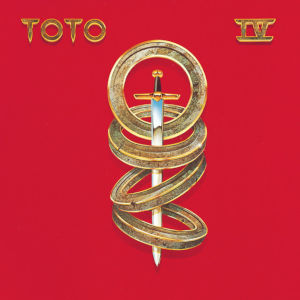
Toto IV
Toto IV is the fourth studio album by American rock band Toto, released in March 1982 by Columbia Records.
Toto IV
March 26, 1982[1]
October 1981 – January 1982[2]
- Sunset Sound, Los Angeles
- Record One, Los Angeles
- Hogg Manor, Sherman Oaks
- Abbey Road, London
42:17
The lead single, "Rosanna", peaked at number 2 for five weeks on the Billboard Hot 100 charts, while the album's third single, "Africa", topping the Hot 100 chart, became the group's first and only number 1 hit.[9] Both songs were hits in the UK as well, reaching number 12 and 3, respectively.[10] The fourth single, "I Won't Hold You Back", also peaked within the top ten on the Hot 100, at number 10, but atop the Billboard Adult Contemporary charts for three weeks.[9] It also went into the top 40 in the UK.[10] With the success of "Africa", the album climbed back into the top 10 in early 1983 on both sides of the Atlantic.
Toto IV received three Grammy Awards in 1983 including Album of the Year, Producer of the Year for the band, and Record of the Year for "Rosanna". It reached number four on the Billboard 200 album charts in the United States, shortly after its release. It also reached the top ten in other countries, including Canada, Australia, New Zealand, the Netherlands, Italy, Norway, the United Kingdom, and Japan. It was also the last Toto album to feature their original bassist David Hungate until his return in 2014 (with the release of their 2015 album Toto XIV) when he was replaced by Mike Porcaro after the band’s recording of the album, and also the final album to feature original lead vocalist Bobby Kimball until his comeback in 1998 (with the release of the 1999 album Mindfields).
Background[edit]
After the success of their self-titled debut, Toto struggled to sustain success on their next two albums, Hydra and Turn Back. The band was under heavy pressure from Columbia Records to deliver a hit album with their next release or be at risk of being dropped from the label.
The band went back to the formula that helped them succeed on their first album, having an album that touched on many different genres of music. They also utilized many outside musicians to help give the sound a more polished, fuller feel than they had on past albums.
This was the final album with the original Toto lineup. David Hungate, who moved to Nashville during the recording of the album, left the band to spend more time with his family. Two years later, prior to beginning recording of their follow-up album, Bobby Kimball was fired by the band due to drug issues that were damaging his voice.
The band delayed touring after the release of the album to instead help in the production of Michael Jackson's Thriller album, as well as collaborating on Chicago's comeback album Chicago 16 that same year.
Production[edit]
Recording took place across several months in 1981 and 1982, and the band was allowed a much larger than average recording budget. At a time when most bands were using a single 24-track recorder, Toto used as many as three separate 24-track recorders simultaneously.[11]
The multiple 24-track recorders were linked via a computerized SMPTE timecode system. One track of each machine contained the timecode synchronization signal, while the remaining 23 tracks of each reel were available for audio track recordings. A significant number of tracks were copied and mixed down from those already recorded on another synchronized tape reel. This process lowered the amount of wear on the first generation tapes and helped maintain high quality sound during the extensive overdubbing and mixing process.[11]
Cover art[edit]
Philip Garris's original emblem from the Toto album was updated to show four rings since this was their fourth album. The newer looking, well-polished ring around the hilt of the sword represented their latest work. Each successive ring showed a little more wear and a few more chips which represented the band's previous records.[12]
Adapted from album's liner notes.[13]
Toto
Additional personnel